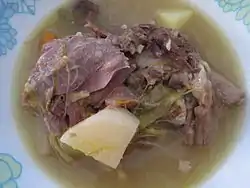Garbure
Garbure is a thick French stew traditionally based on cabbage and confit d'oie,[1] though the modern version is usually made with ham, cheese and stale bread added.[2] The name derives from the use of the term garb to describe sheaves of grain depicted on a heraldic shield or coat of arms. Thus the name of garbure, which is eaten with a fork, is a reference to the use of pitchforks to pick up sheaves of grain.[3] It originated in Gascony in southwest France. It is similar to potée.[4]
 | |
| Type | Soup or stew |
|---|---|
| Place of origin | France |
| Main ingredients | Ham, cabbage and other vegetables, cheese, stale bread |
Garbure was the daily sustenance of Gascon peasantry. It differed from one home to the next and varied with the rhythms of the seasons, the resources of the cook, and with household income. The basic principle behind this dish is the lengthy simmering of an assortment of vegetables and meats, generally meats preserved en confit. As far as vegetables go, anything is possible. The cabbage may be accompanied by broad beans, fresh or dried, mangetout peas, potatoes, turnips, peas, onions, carrots, celeriac, kohlrabi, beets, lettuce, chestnuts, nettles or borage. Thus the garbure could be adapted to the needs of every household.
A large tureen of garbure is often presented to the table in Bearnais restaurants, and guests can help themselves to as much as they wish at the start of the meal using the ladle supplied.
Frequently the meal would end with a traditional chabrot, which is a custom of mixing half a glass of red wine in with the liquid left in the bottom of one's bowl after eating the solid contents, and then consuming it.
See also
References
- ROBUCHON, J., & MONTAGNÉ, P. (2001). Larousse gastronomique. New York, Clarkson Potter.
- Smith, Henry (1900). The Master Books of Soups. Bedford, MA, USA: Applewood Books. p. 175. ISBN 978-1-4290-1180-8.
- Dallas, E. S. (1877). Kettner's Book of the Table. London, England: Dulau & Company. p. 15.
garbure.
- w:fr:Garbure
.jpg.webp)